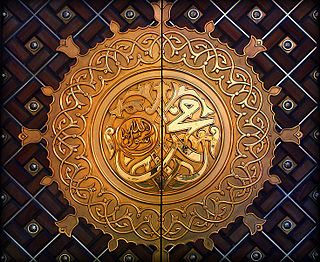Abd Allah, also spelled Abdullah, Abdhullah, Abdellah, Abdollah, Abdallah, Abdulla, Abdalla and many others, is an Arabic name meaning "Servant of God". It is built from the Arabic words ʻabd and Allāh. Although the first letter "a" in Allāh, as the first letter of the article al-, is usually unstressed in Arabic, it is usually stressed in the pronunciation of this name. The variants Abdollah and Abdullah represent the elision of this "a" following the "u" of the Classical Arabic nominative case. Abd Allah is one of many Arabic theophoric names, meaning servant of God. God's Follower is also a meaning of this name.
Mansour ; also spelled Mounsor, Monsur (Bengali), Mansoor, Manser, Mansur, Mansyur (Indonesian) or Mensur (Turkish), is a male Arabic name that means "He who is victorious", from the Arabic root naṣr (نصر), meaning "victory."
Ahmad is an Arabic male given name common in most parts of the Muslim world. Other English spellings of the name include Ahmed and Ahmet. It is also used as a surname.
Abd al-Aziz, frequently also transliterated Abdul-Aziz, is a male Arabic Muslim given name and, in modern usage, surname. It is built from the words ʽAbd, the Arabic definite article and ʽAzīz "Almighty". The name is commonly abbreviated as "ʽAzīz". The name means "servant of the Almighty", al-ʽAzīz being one of the names of God in Islam, which give rise to the Muslim theophoric names.
Saʽid, also spelled Saʽeid, Said, Saïd, Sid, Saeed, Saed, Saied, Sayeed or Sayid, is a male Arabic given name which means "blessed, good luck, joy" or "happy, patient". The name stems from the Arabic verb sa‘ada.
ʻAbd al-Ḥamīd, also spelled as Abdulhamid, Abd-ul Hamid, and Abd ol-Hamid, is a Muslim male given name, and in modern usage, surname. It is built from the Arabic words ʻabd and al-Ḥamīd, one of the names of God in the Qur'an, which gave rise to the Muslim theophoric names. It means "servant of the All-laudable".
Jamaal is an Arabic masculine given name, meaning "beauty", and a surname. It is used in the Middle East, North Africa, West Africa, East Africa, Central Asia, the Caucasus, the Balkans, and predominantly Muslim countries in South Asia and Southeast Asia. It is also used amongst African American peoples.
Ammar ibn Yasir was a companion of Muhammad and a commander in the early Muslim conquests. His parents, Sumayya and Yasir ibn Amir, were the first martyrs of the Ummah. Ammar converted to Islam by the invitation of Abu Bakr and was amongst the muhajirun. After the migration to Medina, he participated in building the Prophet's Mosque and fought in most of the early Muslim expeditions.
Yusuf is a male name meaning "God increases". It is the Arabic equivalent of the Hebrew name Yosef and the English name Joseph. It is widely used in many parts of the world by Arabs of all Abrahamic religions, including Middle Eastern Jews, Arab Christians, and Muslims.
Tariq is an Arabic word and given name.

Waleed or al-Waleed (الولید), also spelled al-Walid, Walid, Oualid, or Velid, is an Arabic-language masculine given name meaning newborn child.
Saad is a common male Arabic given name. The name stems from the Arabic verb sa‘ada.

Muhammad, also spelled Muhammed, Muhamad, Mohammad, Mohammed, Mahammad, Maxammed, Mehemmed, Mohamad, Mohamed, or in a variety of other ways, is an Arabic given male name meaning 'praiseworthy'. The name comes from the passive participle of the Arabic verb ḥammada (حَمَّدَ), meaning 'to praise', which itself comes from the triconsonantal Semitic root Ḥ-M-D. Believed to be the most popular name in the world, by 2014 it was estimated to have been given to 150 million men and boys.
Abdelrahman or Abd al-Rahman or Abdul Rahman or Abdurrahman or Abdrrahman is a male Arabic Muslim given name, and in modern usage, surname. It is built from the Arabic words Abd, al- and Rahman. The name means "servant of the most gracious", ar-Rahman being one of the names of God in the Qur'an, which give rise to the Muslim theophoric names.
Yakub, Yaqub, Yaqoob, Yaqoub, Yacoub, Yakoub or Yaâkub is a male given name. It is the Arabic version of Jacob and James. The Arabic form Ya'qūb/Ya'kūb may be direct from the Hebrew or indirectly through Syriac. The name was in use in pre-Islamic Arabia and is a common given name in Arab, Turkish, and Muslim societies. It is also used as a surname. It is common in Polish, Czech and Slovak languages, where it is transliterated as Jakub.
Ziyad is an Arabic given name and surname.
Osama, also spelt Osamah, Oussama, Usama, and other variants, is an Arabic masculine given name.
ʻAbd al-Raḥīm is a male Muslim given name, and in modern usage, surname. It is built from the Arabic words ʻabd, al-Raḥīm, one of the names of God in the Qur'an, which give rise to the Muslim theophoric names. It means "servant of the merciful".
Khalid is a popular Arabic male given name meaning "eternal, everlasting, immortal". It also appears as a surname.

Omar/Umar/Omer is a masculine given name that has different origins in Arabic, Hebrew, and German.


